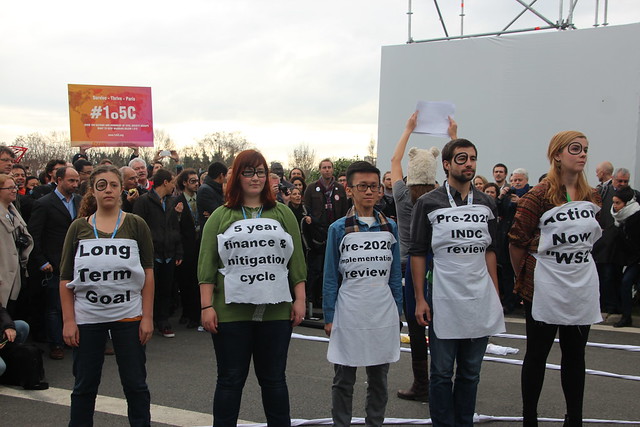http://e-info.org.tw/node/117996
比學貸、薪資凍漲嚴重 氣候變遷重擊美千禧世代
文字大小
181 1 Share1
本報2016年8月29日綜合外電報導,姜唯編譯;蔡麗伶審校
氣候變遷影響千禧世代的未來,恐比學貸和薪資凍漲要嚴重!美國研究指出,由於氣候變遷衝擊全球經濟,削弱美國生產力,現今20幾歲至30幾歲的年輕人一生所能賺取的財產,總共將縮水數兆美元,而千禧世代的下一代將承受更龐大的損失。
多名青年在去年底召開的COP21大會場外抗議,要求升溫限制在1.5°C。圖中左三為台灣青年氣候聯盟成員趙威翔。攝影:John Englart。圖片來源:CC授權。
美國「下一代氣候行動」組織(NextGen Climate Action)發表的新報告指出,如果沒能減少溫室氣體排放並緩解全球暖化,今日21歲的大學生一生總共將損失12萬6000美金(約新台幣400萬元)的薪水、18萬7000美金(約新台幣595萬元)的長期儲蓄和投資,比學貸和薪資凍漲還嚴重。美國整個千禧世代——總計7540萬人——總共將損失8.8兆美金。
所謂的千禧世代,依照美國智庫皮尤研究中心的定義,指的是2015年18至34歲的人。
自由派人士:暖化可能是這個世代的最大威脅
下一代氣候行動是一個非營利環境倡議組織,由下一代氣候行動委員會成立。下一代氣候行動委員會是規模驚人的政治行動委員會,根據的OpenSecrets.org資料,這個委員會2014年投注7400萬美元支持民主黨參議院和州長選舉。
「下一代氣候行動」組織創辦人、身價數十億的自由派氣候倡議人士思特爾(Tom Steyer)表示,全球暖化很可能是這個世代最大的威脅。
今年6月,思特爾公開表態支持民主黨總統候選人希拉蕊,肯定其對抗氣候危機、使美國成為21世紀乾淨能源強權的承諾。共和黨總統候選人川普不只一次否定人為溫室氣體排放造成暖化的科學證據,並反對歐巴馬減少化石燃料的努力。
「希拉蕊和川普之間的差異非常明顯,尤其是對氣候和乾淨能源的態度。」思特爾說。
研究:高溫擴大貧富差距 全球平均收入減少1/4
儘管下一代氣候行動有明顯的政治傾向,報告的資料來源是史丹佛大學和加州大學柏克萊分校的中立研究。這份去年10月發表於《自然》期刊的研究顯示,氣候變遷對經濟的損害,高出過去評估的十倍。
研究人員指出,高溫可能減少全球平均收入達1/4,其中最大的衝擊來自極端溫度限制戶外工作時間、改變農業產量,以及海平面上升侵蝕人口密度高、經濟生產力高的沿海城市。
這份研究和其他研究也發現,高溫可能擴大貧富差距。
研究人員檢視歷時50年、來自166國的歷史資料,比較平均氣溫高低時各國的經濟表現,發現國家的總體經濟生產力——勞工數、勞工生產力和作物產量——在年均溫13°C的時候最佳,攝氏20-30°C時最差。
單就美國而言,如果沒採取氣候行動,2050年GDP可能減少5%,2100年人均GDP將減少36%。
【相關文章】
【參考資料】
- MashableAsia(2016年8月23日),Climate change could be worse than student debt, Great Recession for millennials' income
Climate change could cost millennials trillions of dollars in lifetime income
IMAGE: RINGO CHIU/AFP/GETTY IMAGES
Americans in their 20s and 30s could lose trillions of dollars in potential lifetime earnings as climate change disrupts the global economy and weakens U.S. productivity, according to a new report by NextGen Climate said.
If countries fail to reduce greenhouse gas emissions and limit the amount and pace of global warming, a 21-year-old college graduate today could lose $126,000 in lifetime wages and $187,000 in long-term savings and investments, the report found.
This would outrank the lost income due to student debt or wage stagnation.
As an entire generation, U.S. millennials — all 75.4 million of them — could lose nearly $8.8 trillion in lifetime income without climate action, NextGen said. Those losses could keep climbing for the children of millennials and beyond.
“Global warming may very well be the biggest threat over the lifetime of a single generation,” Tom Steyer, the billionaire liberal climate activist and founding president of NextGen, told reporters Monday on a press call.
The NextGen report defines millennials as all Americans ages 18-34 in 2015, which is the same definition the Pew Research Center uses.
NextGen is prominent in Democratic politics
NextGen is a nonprofit environmental advocacy organization funded by the NextGen Climate Action Committee, a super PAC that spent $74 million in 2014 to support Democratic candidates in Senate and gubernatorial races, according to OpenSecrets.org.
In June, Steyer formally endorsed Hillary Clinton, the Democratic presidential nominee, citing her promises to confront the global climate crisis and make the U.S. a “clean energy superpower of the 21st century.”
NextGen plans to spend at least $25 million on voter turnout in Pennsylvania, Iowa, Ohio, New Hampshire, Nevada, Illinois and Colorado during the 2016 election cycle. "We really see climate as our candidate and think it’s important to educate voters on where the candidates stand on climate change and clean energy..." said NextGen spokeswoman Suzanne Henkels in an email to Mashable.
IMAGE: AFP/GETTY IMAGES
The new report from NextGen is part of the group’s broader effort to reach younger voters ahead of the 2016 presidential elections. The advocacy organization is active at 200 college campuses in battleground states like Ohio and Colorado.
Donald Trump, the Republican presidential nominee, has repeatedly rejected the scientific conclusion that human-caused greenhouse gas emissions are causing global warming and opposes the Obama administration's efforts to reduce the use of fossil fuels.
“The difference between Hillary Clinton and Mr. Trump couldn’t be more stark, especially when it comes to climate and clean energy,” Steyer said on the press call.
Academic underpinnings
Despite NextGen’s Democratic bent, the report’s main findings — that climate change will deprive millennials of potential earnings — is based on a nonpartisan study by researchers at Stanford University and the University of California, Berkeley.
IMAGE: NEXTGEN CLIMATE
That study, published in the journal Nature last October, estimated that climate change could cause 10 times as much damage to the global economy as previously estimated.
The researchers said that higher global temperatures could reduce average global incomes by nearly a quarter, compared to a world without climate change.
The higher economic costs would come from extreme heat limiting outdoor work and altering agricultural output, as well as sea level rise eating away at highly populated and economically productive coastal cities, among other impacts.
That study and others have found that a hotter world could also see a widening gap between rich and poor countries.
IMAGE: AFP/GETTY IMAGES
According to Gernot Wagner, a fellow at the Harvard University Center for Environment and consultant for Environmental Defense Fund, the NextGen report picks a small element of theNature paper and “translates it into dollar figures so that everyone can understand it.”
Wagner, who co-authored the book “Climate Shock: The Economic Consequences of a Hotter Planet,” did not participate in the NextGen study or Stanford-Berkeley paper.
“You don’t have to stretch the science or the economics in order to argue that climate change is a problem, and that climate action is necessary,” Wagner said by phone.
“It shouldn’t strike anyone as surprising that climate change costs a lot of money.”
In the 2015 Nature paper, researchers examined 50 years of historical data from 166 countries and compared each country’s own economic performance during warm spells and cooler spells.
IMAGE: AFP/GETTY IMAGES
They determined that a nation’s overall economic productivity — labor supply, labor productivity and crop yields — peaked at an annual average temperature of about 55 degrees Fahrenheit (13 degrees Celsius).
But productivity dropped “abruptly” beyond the range of 68 to 86 degrees Fahrenheit (20-30 degrees Celsius), according to the Stanford and Berkeley team.
For the U.S. in particular, they found gross domestic product could drop 5 percent by 2050 without climate action. By the end of the century, Even steeper declines — up to 36 percent of per capita GDP — could occur by 2100.
The NextGen report borrows these projections to help determine how crop-killing heat waves,more destructive weather events, sea level rise and other climate change-related consequences could affect the future income potential of U.S. millennials.
IMAGE: ROBYN BECK/AFP/GETTY IMAGES
“This is the first time that losses have been applied at the individual level and to generations that will bear the brunt of our actions or inactions,” Heather McGee, a self-identified millennial and president of Demos, a left-leaning research and advocacy group, said on the Monday press call.
“The millennial generation and our children are the ones who will face both the crisis and potentially the opportunity to be part of transforming our economy and our society,” she added.









沒有留言:
張貼留言